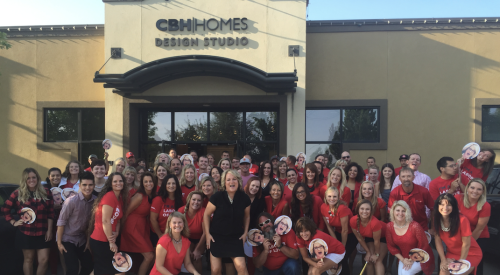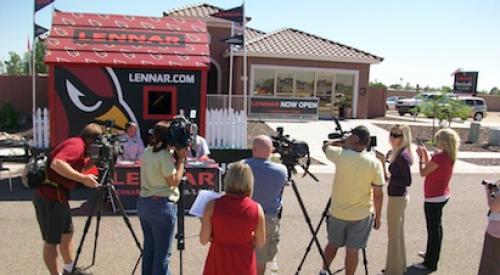|
Builders across the country do a great job at what they do best — using their skills and expertise in building well-constructed homes that are a refuge and, in some cases, the fulfillment of a lifelong dream for its owners.
But when it comes down to it, what makes Joe Schmoe Builders a better home builder than XYZ Homes across town? In reality, maybe not a whole lot. However, in the perception of each builder's customers, the difference could be phenomenal. That's the power of branding.
Branding creates a distinctive idea in the minds of potential buyers about what your company has to offer them in comparison to the competition.
"I don't think most builders think of themselves in terms of building a brand," says David Miles of Milesbrand, a real estate advertising agency. "They're home builders, and they want to give people the best home they can give them for the best price they can give it to them and still make money."
Defining your brand is crucial to creating an effective promotional campaign.
"[Consumers] need all the clues they can get in the marketplace to know where they should spend their time," says Miles. "They don't want to be confused week after week with who you are, or where you fit in or how you're different. They don't want to figure it out....They want you to respect their time and make it easy for them.
"If you're remaining true to the brand," he adds, "you have a higher likelihood that the communication is going to be on target for what you really stand for."
Define your brand"A building company should determine what it is that they do better than the competition," says Jan Mitchell, senior editor for Sales and Marketing magazine, and a contributing editor for Professional Builder. "What are its strengths? Is it architectural design? Affordability? Family-centered communities? Eco-friendliness or energy efficiency?
"You need to figure out what is different in the customer's mind about your company," says Tracy Rubenstein, director of marketing at T.W. Lewis. "That can be achieved through focus groups, surveys — there are a lot of ways to get to that. But I think [determining] that is crucial."
"No matter what your size, or... whether you think of yourself as a brand or not, the market is going to brand you," says Miles. "You have a choice of being intentional about the identity that you want to create in the world, or allowing the market to determine how they think of you."
Builders need to know what their brand represents, and implement a change in direction and/or damage control if the brand perception is negative, ineffective — or unattainable.
Donnie Hanly of Syncon Homes of California currently uses the tagline, "Discover our Difference," to brand his company. "A few years back, we were going with a different theme ...'Expect More,'" Hanly says. "It just set us up for failure. We do a great job on a home. We build it wonderfully. ... They love the house. Then they're still not happy. ... "They say, 'Okay, I've got this, what's next? There's more, right?' ...How do you give them more than — more?"
Practice what you promoteEmployees, customers, suppliers — everyone that does business with your company — has to believe that your brand is genuine.
"Branding is important internally," says Miles, "so that the people that work for the firm really know what the firm stands for and hopefully buy into that — so they become brand evangelists for the culture and the core values and how the company operates in the world."
"Everything that we do from a marketing perspective would be meaningless if the customer experience didn't validate that message," says Rubenstein, who received the 2004 Silver Award for Marketing Director of the Year from the National Sales & Marketing Council of the NAHB. "So that really puts responsibility for the brand in the hands of our sales associates, our construction superintendents — all those people that are coming in contact with the customer [are] responsible for that experience."
Like it or not, people will talk. Do business in such a way that when they talk about your company, what they share is positive and accurately reflects your brand.
"We've had Christmas and holiday parties that we've done over the years," says Hanly, "and brought all of our homeowners in and they've gotten to meet each other."
Hanly says that because the company's brand — which he describes as caring, community minded, and family oriented — is a genuine reflection of how it treats customers, he doesn't have to worry about what sort of commiserating goes on when all his buyers get together.
"If we were putting up a product that was having a lot of issues, or not taking care of our customers," says Hanly, "the last thing we'd want to do is get them all in one place and have them all talk to each other."
Engage the expertsNot every builder intuitively has the skills to do his own promotion and marketing, but he can learn. The NAHB offers the well-known and respected MIRM designation, which stands for Member, Institute of Residential Marketing. To earn a MIRM, candidates must have, among other things, at least three years experience in new home sales and marketing and complete four required courses.
Builders also have the option of hiring the marketing expertise they need through a consultant or marketing firm.
Syncon Homes works exclusively with Rochelle Barcellona, MIRM, and president of Barcellona Inc. "A lot of times we'll come up with an idea," says Hanly, "and we'll just have it in its infancy stage. [Rochelle] will think about it and then come back to us. We'll start meeting together, and with our team, to bring it to the next level."
"We're a little bit decentralized in our agency support," Rubenstein says. "We tend to use a few different firms instead of one firm handling [every]thing. I think that works better for us."
Greenbriar Homes in Fremont, Calif., uses Gauger + Associates as their advertising agency. Gauger came up with the idea of having Greenbriar's CEO Carol Meyer appear regularly on a local television program called "Bay Area Living with Sunset Magazine."
"I agreed to do it," Meyer says, "and I actually did pretty well at it. ... I'm practiced at telling the story and I'm comfortable in front of a camera."
"We did about a four-minute segment once a month," she says. "Some of it was community service in that we talked about getting your home ready for winter. We talked about drainage. [We] talked about pools one time. And then, of course, we'd show all this stuff by showing our houses."
Get in the gameThink business is too hot in your market to bother with promotion? If so, it may not be for long. "In the markets we're in, I don't think anybody has been doing a lot of promotional things," says Hanly. "But everybody has been getting ready to do them, because it's slowed down quite a bit. ... I think there's a lot of stuff that's in the works with a lot of builders, because we have to go back and work a little harder."
|












